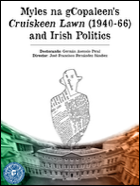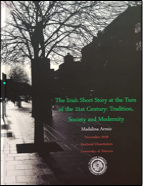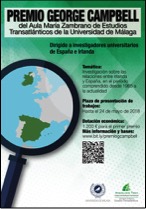The stories and the texts presented here were written roughly in the same period, just after the Second World War, when the author was entering a sober, austere phase in his writing. The three narratives (“The Expelled”, “The Calmative”, and “The End”) present a circular pattern, as if each of them started the same story from scratch, and they each have the same individual as a protagonist, a destitute character with an ailing body, coupled with an active, inquisitive mind, but who at the same time has serious dificulties in communicating with the outside world.
The thirteen fragments that constitute the Texts for Nothing, for their part, do not follow a coherent plot and only separately can they be said to delve into a particular discursive strategy. What they have in common is the presence of a first person voice who questions any bit of information that may be uttered by that same voice. The result is a kind of prose which is fully fragmented and deconstructed.
Winner of the 30th AEDEAN Translation Award in 2016
José Francisco Fernández
Relatos y textos para nada [Stories and Texts for Nothing], by Samuel Beckett
Una llegada inesperada y otros relatos is the first volume of Ha Jin’s short fiction to appear in Spanish. This anthology comprises thirteen narratives published in three different volumes, Under the Red Flag (1997), The Bridegroom (2000), and A Good Fall (2009). Jīn Xuěfēi, who uses Ha Jin as his pen name, can be considered one of the most successful Asian-American authors in current American literature. The thirteen stories in this anthology include eight narrations that explore the dramatic lives led by common folks in rural China during the years of Mao Zedong’s Cultural Revolution and Deng Xiaoping’s rule. The remaining five stories deal with the difficulties experienced by Chinese-American immigrants and their anxiety in their pursuit of the American dream.
Ha Jin, an emigré himself, arrived in the United States in 1985 to pursue a doctorate in American Literature and refused to return to China after the response of Chinese authorities to the demonstrations at Tiananmen Square in June 1989.
Winner of the 29th AEDEAN Translation Award in 2015
José R. Ibáñez & Blasina Cantizano Márquez
Una llegada inesperada y otros relatos, by Ha Jin
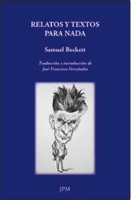
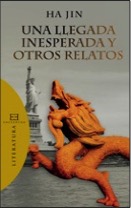
Awards
Irish writer Brian O’Nolan, also known by his pseudonyms Flann O’Brien and Myles na gCopaleen, has been lauded, alongside James Joyce and Samuel Beckett, as one of the central figures of Irish modernism. Among other works, he was the author of the newspaper column Cruiskeen Lawn, published as Myles na gCopaleen in the Irish Times on an almost daily basis from 1940 to 1966. Cruiskeen Lawn was a comic literary column devoted to offering a sharp and incisive portrait of mid-twentieth century Ireland. While dedicated scholarship on Cruiskeen Lawn has emerged in recent years, one of the aspects that most critics have failed to touch upon is the question of Irish politics.
Brian O’Nolan was witness to tumultuous changes to the social, cultural and political fabric of the country: from the creation of the Irish Free State in 1922 to the economic expansion of the 1960s, including the period of The Emergency (1939-45) and the years of economic stagnation and swelling emigration (1945- 54). As such, his Cruiskeen Lawn column became a site of contention and political commentary on all aspects of Irish politics, ranging from the role of the country in international affairs to local minutiae.
The Inés Praga Award is anually bestowed by the Spanish Association for Irish Studies (AEDEI) on the best doctoral dissertation dealing with sociocultural, literary, linguistic and historical issues in the field of Irish Studies.
This thesis explores the Irish short story form as a bridge connecting tradition and modernity. The focus of attention, therefore, is placed on the short stories written and published in Ireland at the turn of the 21st century, coinciding with the rise of the Celtic Tiger phenomenon and its aftermath up to 2013.
In the mid-1990s, Ireland was experiencing the “best of times”, its economic miracle, the promise of a brilliant future. What the Celtic Tiger seemed to instil in the national conscience was that poverty and misery were problems of the past. The impressive economic performance assured that globalised Ireland occupied one of the top positions among the world's economic powers. This was the country where famine and emigration had been a constant threat, where the relationship with England was a never ending drama considering the tragic and violent situation in Northern Ireland, their “problematic child”, and a place where the State, in collusion with the Church, designed an autarchy of perfect families and happy communities, living frugally, unaffected by the developments of the modern world.
Throughout this time, the Irish contemporary short story expressed this distrust and became the voice of conscience of the Irish people. Enabled by its capacity of reflecting change with immediacy and dexterity, the short story was able to see through this smoke-screen created by the Celtic Tiger discourse of national well-being, depicting with veracity the worst and the best of the country.
The EIDUAL Dissertation Award is annually bestowed by the Ph.D. School on the best doctoral dissertation earned at the University of Almeria
The aim of Irish Writers in Spain in the 1960s and 1970s: Pearse Hutchinson and Aidan Higgins is to inquire into the image of Spain that Irish travel literature exposed during 20th century, specifically during t Facos regme, as thspeid s h ms futflin trm of heprsence f rish authors in Spain. This study arises from the assumption that the Irish image of Spain has its own characteristics, distant from a position of cultural superiority or a colonial approach. To validate this proposition, the analytical part of this research project will focus on the narratives of encounter from two Irish authors who are representative of this particular period: Pearse Hutchinson and Aidan Higgins.
The George Campbell Award of Aula María Zambrano de Transatlantic Studies of the University of Malaga promotes the investigation about the relationship between Spain and Ireland. This award is aimed to researchers from all over the world, associated to Spanish or Irish universities and the investigations should focus on relations in any field (historical, cultural, political, social, economic, journalistic, etc.) between both countries during the period since 1965 and nowadays.
The award is named after George Campbell, who was one of Ireland's foremost painters. The artist, who was born in Arklow, Ireland, made the city of Malaga his second homeland, where he spent more than six months a year.
George Campbell Award for Research on Irish Studies 2018
Verónica Membrive Pérez
Winner of the Inés Praga Award 2021 for Best Doctoral Thesis in Irish Studies
Germán Asensio Peral
"Myles na gCopaleen's 'Cruiskeen Lawn' (1940-66) and Irish Politics"
José Francisco Fernández Sánchez (Dissertation Advisor)
Winner of EIDUAL Dissertation Award 2018 for Best Doctoral Dissertation
Madalina Armie
"The Irish Short Story at the Turn of the 21st Century: Tradition, Society and Modernity
José Francisco Fernández Sánchez (Dissertation Advisor)
